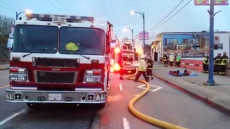VANCOUVER — Winter-like conditions have gripped large areas of central and southeastern British Columbia, prompting weather warnings as snow piles up.
Environment Canada has issued snowfall warnings for the Cariboo, Chilcotin and 100 Mile regions, as well as Yoho and Kootenay Parks, and for mountain passes through the Shuswap, north and east Columbia.
As much as 30 centimetres could blanket the two parks and the mountain passes of southeastern B.C., while accumulations of 15 to 20 centimetres are forecast in the other areas by Tuesday.
The snowy weather arrives on the same day as winter tire regulations come into force across the province, requiring vehicles to be equipped with appropriate winter tires on specific highways across the North, Interior, South Coast, and Vancouver Island.
Drivers whose vehicles don't have tires with either the M+S or mountain/snowflake symbol could face a fine of $109 dollars.
Elsewhere, rainfall warnings remain in effect for Greater Vancouver and Howe Sound, as the weather office calls for up to 50 millimetres of rain through the day, raising the potential for localized flooding in low-lying areas.
'Tis the season: Some B.C. highways will require winter tires starting Monday
Motorists travelling on some British Columbia highways will require winter tires on their vehicles starting Monday.
Not all of B.C.'s highways will require winter tires, but they will be mandatory on some roads in the North, Interior, South Coast, and on Vancouver Island.
Regulations say an appropriate winter tire is one with either the M+S or mountain/snowflake symbol and a minimum tread depth of 3.5 millimetres.
Drivers without proper winter tires on designated B.C. highways can receive a fine of $109.
Also starting Monday, commercial vehicle operators must carry chains and are required to use them when a mandatory chain-up is in place.
Winter tire regulations end on March 31 on many highways, however the regulations have been extended to April 30 on select mountain passes and rural highways to account for early spring snowfall.




